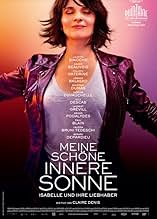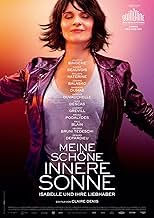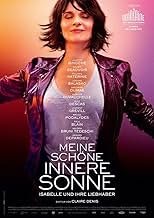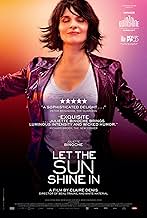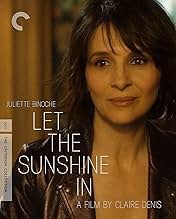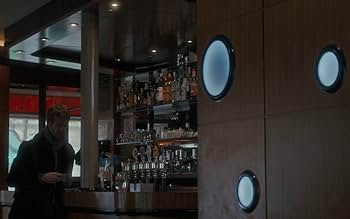Un beau soleil intérieur
- 2017
- Tous publics
- 1h 34m
IMDb RATING
6.0/10
8.1K
YOUR RATING
Isabelle, Parisian artist, divorced mother, is looking for love, true love at last.Isabelle, Parisian artist, divorced mother, is looking for love, true love at last.Isabelle, Parisian artist, divorced mother, is looking for love, true love at last.
- Director
- Writers
- Stars
- Awards
- 2 wins & 13 nominations total
- Director
- Writers
- All cast & crew
- Production, box office & more at IMDbPro
Featured reviews
The tension between wanting something from someone and the fact that it must be given freely and not asked for is at the heart of this film with its typically brilliant performance from Juliette Binoche. Does Isabelle (Binoche) really know what she wants? It seems to be long-lasting romantic love. She hasn't had a lot of luck in that area, despite being beautiful, charming and successful in her career as an artist. We first see her with an unappealing married man. After a lengthy discussion with him, she seems to give up and moves on to a handsome, much younger actor (Nicolas Duvauchelle). He's also married and undecided about divorcing his wife. A typical dilemma, but for Isabelle it seems to be a pattern. These men are simply not available. Later, at a dance club, Isabelle meets someone who seems quite interested, even if he looks like an aging rock star (the kind who didn't get fat). We soon see the same conflict develop: Isabelle wants something the man cannot give, or not right away anyway. There follows a very brief flirtation with a friend of a friend and Isabelle ends up meeting with a counselor of some kind (Gérard Depardieu) who seems to tell her that her life has simply gone as it should...most enigmatically, that she will meet a man who understands and connects with her, but he too will not be "the one". The counselor says that Isabelle must become aware of her "beautiful inner sun" and be content with herself as she is.
In some ways this recent work of Claire Denis can remind a viewer of a film of Eric Rohmer, LE BEAU MARIAGE in particular. Endless discussion about what the protagonist wants. Simply wanting something from someone is not enough to make it happen. But the cinematic style of Claire Denis is miles away from Rohmer's. The editing alone puts UN BEAU SOLEIL INTÉRIEUR firmly in the art film category. Editing and narrative technique, mainly carried out through one-on-one conversation are sometimes elliptical and leave a viewer to decide what has happened. There is also an odd 'nature walk' with strangers who have a lot to say about seemingly nothing, causing Isabelle to go mad for a moment. Perhaps this is to show the extent of her frustration with life and with people in general. Denis chooses to end the film with the counselor scene: a long sequence composed mainly of close-ups of Depardieur while the final credits run, superimposed over the actors' faces.
An often funny film, very compelling thanks to Binoche's exasperating yet amiable characterization.
In some ways this recent work of Claire Denis can remind a viewer of a film of Eric Rohmer, LE BEAU MARIAGE in particular. Endless discussion about what the protagonist wants. Simply wanting something from someone is not enough to make it happen. But the cinematic style of Claire Denis is miles away from Rohmer's. The editing alone puts UN BEAU SOLEIL INTÉRIEUR firmly in the art film category. Editing and narrative technique, mainly carried out through one-on-one conversation are sometimes elliptical and leave a viewer to decide what has happened. There is also an odd 'nature walk' with strangers who have a lot to say about seemingly nothing, causing Isabelle to go mad for a moment. Perhaps this is to show the extent of her frustration with life and with people in general. Denis chooses to end the film with the counselor scene: a long sequence composed mainly of close-ups of Depardieur while the final credits run, superimposed over the actors' faces.
An often funny film, very compelling thanks to Binoche's exasperating yet amiable characterization.
"Let the Sunshine In" (2017 release from France; 94 min.; original title "Un beau soleil intérieur") brings the story of Isabelle. As the movie opens, we see Isabelle, naked, and making love to a guy we later learn is married (but not to Isabelle). Isabelle is enjoying a week of relative freedom as her 10 yr. old daughter is away at her dad's, Isabelle's former husband Francois. Soon we learn that Isabelle is deeply unhappy and restless about where she is in her life, and her love life in particular. At this point we're 10 min. into the movie but to tell you more of the plot would spoil your viewing experience, you'll just have to see for yourself how it all plays out.
Couple of comments: this is the latest movie from French writer-director Claire Denis. Here she gets to work with one of France's treasures, actress Juliette Binoche. Binoche carries this movie on her shoulders from start to finish, and along the way exposes herself in ways I can't recall before. And it has to be said: Binoche is not in her mid-50s but she looks at least 10 years younger. The movie is what one could generalize as being a "typical French talkie", in which there is a lot, a LOT, of conversation and not much else. The director had the great sense of letting scenes play out, for minutes on, without interruption, as if we are simply a fly on the wall listening in on strangers talking. And yet, for all that closeness, I couldn't find myself all that emotionally invested in the movie or these characters. Yes, one feels that Binoche is delivering a towering performance but so what? Last but not least, Gerard Depardieu makes an appearance at the very end of the movie, as a fortune teller of some sort.
""Let the Sunshine In" premiered at last year's Cannes film festival, to positive acclaim (mostly for Juliette Binoche's performance). Almost exactly a year later, this movie finally showed up at my local art-house theater here in Cincinnati. The Saturday matinee performance where I saw this at was not attended well (4 people, including myself), I honestly can't see this playing in the theater very long. If you are interested in "French talkies" or a character study of a woman struggling with various relationships (think "An Unmarried Woman" or "Starting Over"), I'd suggest you check this out, be it in the theater, on VOD, or eventually on DVD/Blu-ray, and draw your own conclusion.
Couple of comments: this is the latest movie from French writer-director Claire Denis. Here she gets to work with one of France's treasures, actress Juliette Binoche. Binoche carries this movie on her shoulders from start to finish, and along the way exposes herself in ways I can't recall before. And it has to be said: Binoche is not in her mid-50s but she looks at least 10 years younger. The movie is what one could generalize as being a "typical French talkie", in which there is a lot, a LOT, of conversation and not much else. The director had the great sense of letting scenes play out, for minutes on, without interruption, as if we are simply a fly on the wall listening in on strangers talking. And yet, for all that closeness, I couldn't find myself all that emotionally invested in the movie or these characters. Yes, one feels that Binoche is delivering a towering performance but so what? Last but not least, Gerard Depardieu makes an appearance at the very end of the movie, as a fortune teller of some sort.
""Let the Sunshine In" premiered at last year's Cannes film festival, to positive acclaim (mostly for Juliette Binoche's performance). Almost exactly a year later, this movie finally showed up at my local art-house theater here in Cincinnati. The Saturday matinee performance where I saw this at was not attended well (4 people, including myself), I honestly can't see this playing in the theater very long. If you are interested in "French talkies" or a character study of a woman struggling with various relationships (think "An Unmarried Woman" or "Starting Over"), I'd suggest you check this out, be it in the theater, on VOD, or eventually on DVD/Blu-ray, and draw your own conclusion.
Audiences went into this French drama as if they were partaking in a romcom buffet at their local boulangerie, but unsurprisingly came out disappointed when they weren't given the usual Katherine Heigl American trash that pollutes the genre. This is not a traditional romantic comedy. I repeat, not a traditional romcom. It is a drama about love, layering themes of romance and philosophies on life through an almost schizophrenic perspective. And with that, Denis has produced a wonderfully intimate portrayal of modern love through her ornate methods of artistic direction. A woman, struggling to find love, becomes involved with multiple men in an attempt to find stability and a relationship.
On the surface, this resembles a vapid pretentious outlook on the morality of men and emotional instability of women. However if you inspect Denis' contemporary storytelling techniques, it's actually a personable venture of self-discovery. A woman acquiring the fragility and tenderness that love shares with its victims, both a curse and a blessing. Coming to terms with how delicate a relationship can be, with a persistence on why certain aspects "should not be rushed".
The various men she encounters all treat her differently. A rich banker uses her to cheat on his wife, an actor regrets sleeping with her on the first meet and her ex-boyfriend/husband is unable to rekindle their flame. The only man who she believes treats her appropriately is seemingly the complete opposite to her personality, with her colleagues subconsciously planting doubt in her mind.
Denis consistently hones in on her neurotic behaviour which, whilst provides a very subtle amount of humour, allows her to experience the pain of love. It does inadvertently force her character to be disconnected with the audience, and on occasion results in her having a low morality compass. Yet fortunately the drama is shrouded in humanity. Everything felt natural. What helped elevate this was Denis' direction. A ludicrous amount of one take scenes allow us to become involved in their lives. The most notable of these being an eight minute unedited scene to which she talks to a banker at a bar. It also showcases Binoche's fantastic performance as she switches between emotions almost instantly. One second she is happily in love, the next filling her mind with doubt.
The scenes of sexual nature however felt rather excessive, particularly the introductory scene, that detracted from Denis' classy artistry. It may have highlighted the sleazy behaviour of these characters, but contrasts with the delicate portrayal of love. A nice touch that I found noteworthy was the concluding conversation with Depardieu. Midway through, the credits start rolling to emphasise the distractions that romances can cause, and it's these sort of contemporary details that enhance the film's interpretation.
Denis is certainly crafting films that aren't particularly accessible to the typical audience, but that does not result in her films being just exercises in vapidity. There's an intricate amount of humanity that brings life to this unconventional "romcom" that really should not be blocking that elusive sunshine.
On the surface, this resembles a vapid pretentious outlook on the morality of men and emotional instability of women. However if you inspect Denis' contemporary storytelling techniques, it's actually a personable venture of self-discovery. A woman acquiring the fragility and tenderness that love shares with its victims, both a curse and a blessing. Coming to terms with how delicate a relationship can be, with a persistence on why certain aspects "should not be rushed".
The various men she encounters all treat her differently. A rich banker uses her to cheat on his wife, an actor regrets sleeping with her on the first meet and her ex-boyfriend/husband is unable to rekindle their flame. The only man who she believes treats her appropriately is seemingly the complete opposite to her personality, with her colleagues subconsciously planting doubt in her mind.
Denis consistently hones in on her neurotic behaviour which, whilst provides a very subtle amount of humour, allows her to experience the pain of love. It does inadvertently force her character to be disconnected with the audience, and on occasion results in her having a low morality compass. Yet fortunately the drama is shrouded in humanity. Everything felt natural. What helped elevate this was Denis' direction. A ludicrous amount of one take scenes allow us to become involved in their lives. The most notable of these being an eight minute unedited scene to which she talks to a banker at a bar. It also showcases Binoche's fantastic performance as she switches between emotions almost instantly. One second she is happily in love, the next filling her mind with doubt.
The scenes of sexual nature however felt rather excessive, particularly the introductory scene, that detracted from Denis' classy artistry. It may have highlighted the sleazy behaviour of these characters, but contrasts with the delicate portrayal of love. A nice touch that I found noteworthy was the concluding conversation with Depardieu. Midway through, the credits start rolling to emphasise the distractions that romances can cause, and it's these sort of contemporary details that enhance the film's interpretation.
Denis is certainly crafting films that aren't particularly accessible to the typical audience, but that does not result in her films being just exercises in vapidity. There's an intricate amount of humanity that brings life to this unconventional "romcom" that really should not be blocking that elusive sunshine.
I hadn't seen a preview or even read a precis before going, but I generally like French movies, so I went. I didn't know what to make of it -- at the beginning I thought it was a drama, but then the scenes got absurdly exaggerated, and I decided it must be a comedy that the language barrier kept me from finding funny. So I was surprised to learn from the reviews here that it was not a comedy! I still don't know what to make of it. So, my advice is, if you have to pay money to see this and you don't speak fluent French, don't bother (in my case, I have a theater membership that allows me pretty much unlimited movies, so I do tend to take chances).
I don't recall any other time when I related with a protagonist in a film this much. Every aspect of the lead character, Isabelle was portraying me ...some much so that I felt 'naked' emotionally. Claire Denis is a living legend. Juliette Binoche is an amazing actress...definitely a performance worthy of an Oscar
Did you know
- TriviaThis film is part of the Criterion Collection, spine #976.
- Crazy creditsClosing credits are seen over a therapy session with David and Isabelle.
- How long is Let the Sunshine In?Powered by Alexa
Details
- Release date
- Countries of origin
- Official sites
- Language
- Also known as
- Un Beau Soleil Intérieur
- Filming locations
- Paris, France(Main Location)
- Production companies
- See more company credits at IMDbPro
Box office
- Budget
- €2,978,000 (estimated)
- Gross US & Canada
- $892,421
- Opening weekend US & Canada
- $39,699
- Apr 29, 2018
- Gross worldwide
- $4,192,590
- Runtime1 hour 34 minutes
- Color
- Aspect ratio
- 1.66 : 1
Contribute to this page
Suggest an edit or add missing content




